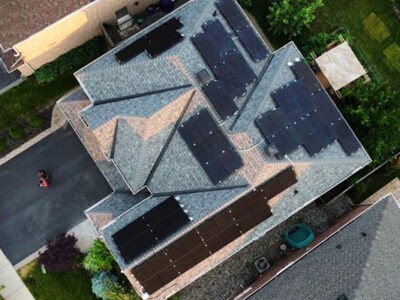Elon Musk Buys Up SolarCity Shares, Stock Jumps
Billionaire entrepreneur Elon Musk has acquired another $10 million worth of shares of solar tech installer SolarCity, according to a filing. While Musk bought the shares on Friday, SolarCity’s jumped on Wednesday by over 23.46% at one point to $22.60 during morning trading. Musk, who is chairman of SolarCity and CEO of electric car maker Tesla Motors, bought the shares when SolarCity’s stock hit $17.56 per share. That was one of the company’s lowest trading prices in three years.
Musk’s acquisition could be giving investors confidence in SolarCity as a long-term investment. In addition, Musk—who helped create the company along with his cousins Lyndon and Peter Rive—could see the low stock price as a good deal to buy up shares when they’re particularly cheap.
Can a Reality TV Show Help Cut America’s Power Bill?
Tristam Coffin looks like someone you’d imagine being a Whole Foods “sustainable facilities” coordinator—he sports jeans and a casual button-down shirt, with springy blond locks brushing over his collar. Not too long ago, Coffin was standing in a kitchen at the back of a Whole Foods store in San Francisco when he saw something he considered extraordinary: three men in suits.
Before long, the three men, holding pens and notepads, climbed to the store’s roof, looking at ducts, pipes, and the assorted mechanicals that make up the cardiopulmonary system of a modern grocer. The trio weren’t Coffin’s co-workers—they were his buttoned-up equivalents from hotel giant Hilton Worldwide Holdings Inc. They are part of a unique exchange program organized by the U.S. Department of Energy that packages the most boring possible topic—corporate energy efficiency—into a reality television show for the web.
Target, Do Solar Like You Do the Grammys
During the Grammys this week, the retail giant Target pulled out all the stops with its live music video starring the singing, acting, and dancing Gwen Stefani. To great fanfare, last year the retailer had partnered with Imagine Dragons, who performed during the awards show atop a circular stage painted with a signature red bull’s-eye. With this year’s four-minute commercial extravaganza, Target reportedly wanted to ‘one-up itself.’
By most objective measures, it did, with multiple set and costume changes, exposure through three different social media platforms, even a surprise roller-skating accident by a Stefani stunt-double that caused a mild freak-out in the internet. Generating increasing levels of buzz at the Grammys has become something of a tradition for the trendy retailer, but there’s no reason for the company to confine itself there. We at Environment America think Target can “one-up itself” in another way: rooftop solar power.
SolarCity will use Tesla’s Powerpack to deliver solar power even when it’s dark
No source of energy is perfect and one of the traditional drawbacks of solar energy has been that it’s tough to generate new power when it’s dark outside. However, SolarCity announced this week that it’s taken a big step toward fixing this problem by agreeing to use Tesla’s 52 MWh Powerpack lithium-ion battery storage system for its massive solar power project that it’s building in Hawaii for the Kaua’i Island Utility Cooperative (KIUC). SolarCity, of course, is chaired by Tesla CEO Elon Musk so the decision to go with the Powerpack is pretty convenient for both companies.
SolarCity says it believes that its collaboration with Tesla will produce “the first utility-scale system in the U.S. to provide dispatchable solar energy, meaning that the utility can count on electricity being available when it’s needed, even hours after the sun goes down.” To be clear, using the Powerpack won’t completely eliminate the need for non-solar resources at night since it’s projected to feed up to 13 megawatts of electricity onto the grid, which will only reduce the amount of power used by non-renewable sources.















Comments